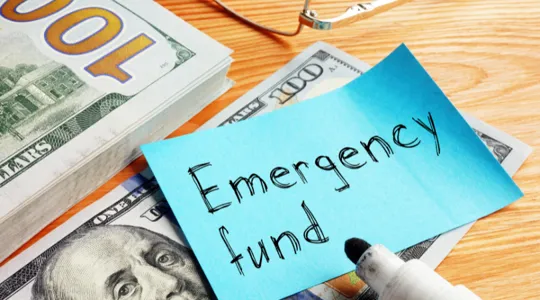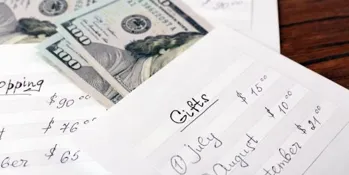- Quick Summary
- What is the Best Place to Keep Emergency Funds?
- Should an Emergency Fund be in a Savings Account?
- Should I Put My Emergency Fund in a CD?
- Is a Money Market Account Good for an Emergency Fund?
- Should I Keep the Emergency Fund in a Checking Account?
- Is a Roth IRA Good for an Emergency Fund?
- Is a Brokerage a Good Place for an Emergency Fund?
- Can I Use a 401 (k) as an Emergency Fund?
- Can I Use an I Savings Bond for an Emergency Fund?
- Should an Emergency Fund be in Gold?
- Should an Emergency Fund be in Silver?
- Can I Keep an Emergency Fund in Bitcoin?
- Is an Emergency Fund Important?
- Should I Keep an Emergency Fund in the House?
- How Much Should I Keep in an Emergency Fund?
- How Do I Start an Emergency Fund?
- When to Spend an Emergency Fund
- Frequently Asked Questions
- Why Saving for an Emergency is Imperative

- Quick Summary
- What is the Best Place to Keep Emergency Funds?
- Should an Emergency Fund be in a Savings Account?
- Should I Put My Emergency Fund in a CD?
- Is a Money Market Account Good for an Emergency Fund?
- Should I Keep the Emergency Fund in a Checking Account?
- Is a Roth IRA Good for an Emergency Fund?
- Is a Brokerage a Good Place for an Emergency Fund?
- Can I Use a 401 (k) as an Emergency Fund?
- Can I Use an I Savings Bond for an Emergency Fund?
- Should an Emergency Fund be in Gold?
- Should an Emergency Fund be in Silver?
- Can I Keep an Emergency Fund in Bitcoin?
- Is an Emergency Fund Important?
- Should I Keep an Emergency Fund in the House?
- How Much Should I Keep in an Emergency Fund?
- How Do I Start an Emergency Fund?
- When to Spend an Emergency Fund
- Frequently Asked Questions
- Why Saving for an Emergency is Imperative
A financial emergency could bankrupt you if you don’t have the money to cover it. You could have an accident or lose your job. That’s why an emergency fund is so vital. Saving up for that rainy day is one thing, but where you keep the money is another matter altogether.
It's not just essential to have the emergency fund, but you also have access to it.
What is the Best Place to Keep Emergency Funds?
Image Source: time.com
The best place for an individual to keep an emergency fund is separate from a primary savings or checking account. It should be in its own designated account. The emergency fund must be easily accessible for use. Some options include money market and high-yield savings accounts.
There are several places to keep your emergency funds where you can access them when needed. But beware of some accounts that could limit access to your funds at vital moments.
Should an Emergency Fund be in a Savings Account?
Many banks and credit unions offer traditional savings accounts. You can open up a savings account with the bank you are currently doing business with.
Resist the urge to combine your emergency account with your regular savings account. They should be separate. In other words, you must have two savings accounts—one for savings and one for emergencies.
The problem with traditional accounts is that they pay very little interest. According to the Federal Deposit Insurance Corporation (FDIC), a traditional savings account's average percentage yield is 0.46 percent APY.
But remember the highest priority for an emergency fund isn't so much interest growth as accessibility.
But if you want to grow your fund a little more, another savings account option exists.
High-Yield Savings Accounts
A high-yield savings account is a great place to keep a rainy-day fund. They are offered by online banks. Some online-only branches for larger banks also offer high-yield savings accounts.
Because online banks don't have brick-and-mortar branches, they save money. They pass the savings on to their customers in the form of higher APYs.
These high-yield savings’ APYs are as high as 5.25 percent. That’s quite a bit higher than a traditional savings account.
Should I Put My Emergency Fund in a CD?
Image Source: bankrate.com
A certificate deposit (CD) is an account that has a high fixed rate for a specific term. But there's a catch. You can only withdraw your money once the term is up. Usually, the term is one year, but there are two- and three-year CDs.
The competitive one-year CDs earn as much as 5.60 percent APY. This is even more than a high-yield savings account.
A CD is excellent for saving money. But it is not great for an emergency fund. If your car breaks down or you have another emergency, you won't be able to withdraw funds before the CD term ends.
If you do, there’ll be an early withdrawal penalty. The early withdrawal penalties are typically a portion of the interest earned. You’re basically taking a gamble that you won’t need money during the CD’s term.
Some CDs are more flexible and don't have a penalty. But these earn less interest than even high-yield savings accounts.
Is a Money Market Account Good for an Emergency Fund?
Image Source: jeniusbank.com
Money market accounts are like high-yield savings accounts. But although they both earn a higher APY than a traditional bank or credit union savings account, there are three distinct differences in how they operate. These differences are:
-
Money market accounts often come with check-writing capabilities or a debit card.
-
Money market accounts generally require a larger minimum deposit to open an account.
-
Some accounts have tiered interest rates based on account balance.
Some online banks offer higher interest rates for their money market accounts. This is because they don’t have to maintain brick-and-mortar branches.
Monthly Withdrawals May Be Limited
In the past, federal law dictated the number of withdrawals or transfers you could make from a money market account monthly. You could only do this six times per month. This was the Regulation D requirement.
But in 2020, the regulation was modified so you can now make unlimited withdrawals over the phone. But the teller must cut you a check by mail. If the bank processes the request online, it goes against the monthly limit.
Regardless of federal law, many banks have a limit as to how many times you can withdraw from a money market account. If you go over their stated amount, you must pay a fee.
But this shouldn't be a factor if these are funds for an emergency.
Should I Keep the Emergency Fund in a Checking Account?
Image Source: Forbes.com
Don’t keep your emergency funds in the same account you use for everyday finances. For one it’s too accessible. You’ll spend it and tell yourself it will be put back later. That never happens.
You also aren’t earning the interest you would receive from other accounts.
For example, the average interest from an interest-bearing checking account is 0.07 percent. And most checking accounts don’t offer any interest. There are other places to park your emergency funds.
Is a Roth IRA Good for an Emergency Fund?
Image Source: Marca.com
You can use a Roth IRS as an emergency savings account. Funds can be withdrawn at any time without taxes or penalties. Ensure you check the rules regarding the type of funds you can withdraw tax or penalty-free.
That’s because you can only withdraw the contributions to receive these benefits.
Pay it back quickly, or you'll miss years of tax-free compound growth.
But keep in mind if you're using a Roth IRA for an emergency fund because it could lose value. You may want to choose a more conservative option.
Is a Brokerage a Good Place for an Emergency Fund?
Image Source: tradebrains.in
When you invest in the stock market, there's risk. Depending on if the bull or bear is running you could lose your investment overnight. It may not be a total loss, but partial losses are possible. You might also find that it's difficult to access your funds.
If you find yourself suddenly unemployed, the money may not be there. Or you won’t be able to sell your stocks in time to avoid additional loss.
Are Futures Good for Emergency Funds
Trading security futures is not a good place to keep your emergency fund. You can lose a substantial amount of money in a short time. The risk amount is unlimited. You could lose your entire nest egg in hours.
Can I Use a 401 (k) as an Emergency Fund?
You would have to borrow from your 401 (k) plan and then pay it back with interest. The IRS regulations say that plans can offer loans to employees up to 50 percent of their vested balance. The most you would be able to borrow is $50,000.
But, your employer isn’t required to offer you loans. So, check with your plan administrator before you decide to use your 401(k) as an emergency fund.
It's probably not the best option since you must pay the money back, plus interest.
Can I Use an I Savings Bond for an Emergency Fund?
Image Source: Money.com
Federal bonds tied to the inflation rate are called Series I savings bonds. The interest rates for these bonds change twice a year, once in May and once in November.
Although they are a safe investment, they’re not a good place to park your emergency funds.
That’s because bonds must be held for five years. If you redeem them within the first year, you'll lose the previous three months' interest. Since the interest goes up with inflation, that could be significant.
Should an Emergency Fund be in Gold?
Image Source: myjar.app
Gold is easily purchased. For instance, it can be purchased in:
- Jewelry
- Coins
However, purchasing gold in this manner may not be as easy to sell or lucrative. These items are inconvenient due to the required origination and purity certificates. You also may not receive your investment back.
But if you take the digital route of purchasing gold, selling is relatively easy. Some digital means of buying gold include:
- Gold ETFs
- Gold Mutual Funds
- Gold Bullion
These gold investments can be redeemed within a few days. It is considered a liquid investment. Liquid means quickly sold.
Gold is usually considered a safe asset. It usually retains or increases in value during market turbulence. It is regarded as a hedge against inflation.
But be mindful that it's still an investment. And even though it may be fiscally safer than stocks, there is still some risk of loss.
Should an Emergency Fund be in Silver?
Keeping silver coins on hand is tempting. But when you go to sell, you must find a coin shop or pawn shop willing to pay the price. It’s not easily accessible as a result.
There are other ways to invest in silver. They include:
- Silver bullion
- Silver futures contracts
- Silver ETFs
Silver has been volatile in the last few years. It dropped 25 percent in April 2021. But except for the coins in your sock drawer, it does offer relatively quick access.
Can I Keep an Emergency Fund in Bitcoin?
Image Source: forkast.news
Cryptocurrency has grown in the last few years from an overlooked asset to an everyday investment. That’s because it doesn’t involve strict involvement in financial institutions like governments or banks.
You can use Bitcoin and other digital assets that can quickly turn into cash.
But, there are several factors that gauge liquidity. They include:
- Bitcoin price
- Trading volume
- Token’s overall market capitalization.
Generally, an emergency fund should be cash in most instances. That means in the bank, not buried in the backyard.
Is an Emergency Fund Important?
A flush emergency fund could be the difference between a fiscal survivor and bankruptcy. A financial emergency not only affects your budget, but it can also hurt you emotionally. Stressing over money can even make you physically ill.
Besides keeping your head above water, an emergency fund can save you in another way. You won't have to take out a loan. Some loans that people have had to take out for emergencies include:
- Personal line of credit
- Secured loan
- Unsecured loan
In most instances, you must put your house up as collateral if you own a home. If you're in a financial crunch, this may be a dangerous alternative.
Interest Rates on Personal Loans
It takes several years to pay these loans off, and it's not low-cost debt. You could be looking at double-digit interest rates.
For example, as of February 2024, the average interest rate for a personal finance loan was between 10.50 and 24 percent.
The interest rate you are charged depends on several factors.
This includes your:
- Credit score
- Income
- Age
- Time to apply for a loan
- The company employed with
If you’re stuck without an emergency fund and must take out a personal loan, be sure to compare different lenders’ rates.
Better Decision-Making with Emergency Fund
In an unplanned event, having an emergency fund allows you to make better and more qualified decisions. Most people want to live a little. An emergency fund helps you do just that.
For example, if you have money set aside for an emergency, you don’t feel guilty having an indulgence occasionally. You’ll have peace of mind with routine purchases.
Should I Keep an Emergency Fund in the House?
By keeping money under a mattress or in your pants drawer, you miss out on growing your fund. You can't earn interest; therefore, you're leaving money on the table. And even if it's not a lot of interest, it's still growth.
You also won’t have insurance for your emergency fund. Banks, including online banks, are insured by the FDIC, and credit unions are protected by the National Credit Union Administration (NCUA).
That means if they fail, you’ll receive your emergency fund back up to $250,000. You won’t have that security if your money’s in an old pickle jar.
You're out of luck if the house burns down or is robbed. There's no recourse.
How Much Should I Keep in an Emergency Fund?
The question of how much money you should keep in an emergency fund will vary slightly depending on the circumstances.
But, financial experts recommend having enough put away to cover three to six months of living expenses if there's a job loss.
Your lifestyle will also influence how much should be in your emergency fund. For example, if you engage in extreme sports or recreation where you could be injured, you may want to beef up your fund.
How Do I Start an Emergency Fund?
Create a functional budget and make funding a rainy-day fund part of it. It should be a financial habit. Set a monthly savings goal and have this money automatically transferred to your account.
Some steps you can take to create your emergency fund include:
- Set monetary goals.
- Determine monthly contributions.
- Deposit monthly contributions on the same day each month.
It will take time, but fortunately, putting the money away doesn't last forever.
Once you've created and socked away enough money, you can stop funding it. You'll only need to budget for it again if you take cash out for an emergency.
That's why it's essential to save it in a safe place where it can earn interest and where the emergency fund accessible in an easy way.
When to Spend an Emergency Fund
An “emergency” means different things to different people. But the bottom line is an emergency fund should only be spent on true problems.
Items to spend an emergency fund on include:
- Major vehicle repair
- Losing your job
- Death in the family
- Hospital stay
- Home repairs
Any time you have the risk of an unexpected income loss or life's unexpected expenses, that’s an emergency. And life can throw many at you.
Frequently Asked Questions
Where is the best place to keep an emergency fund?
The best place to keep an emergency fund is in a separate high-yield savings account. Then, you'll be able to earn high interest while at the same time keeping money easily accessible.
How much emergency fund you should keep?
Financial experts suggest building and saving up to three to six months of living expenses in an emergency fund. But situations vary, so analyze your life and determine your needs.
How do I build an emergency fund?
Create a budget where you set a monthly savings goal. Make it a point to deposit into your savings account automatically. You could also save your tax refund.
Why Saving for an Emergency is Imperative
No one ever thinks an emergency will happen to them. All it takes is one car accident to be temporarily out of the workforce. In the U.S., a car accident happens every 13 minutes. This ups the ante that you could be the next one. Are you prepared?
Making sure your emergency fund is secure should be the main goal. There are several viable options. But consider a high-yield savings account with an online bank. That way, your money will receive a high interest rate and be easily accessible.
Stay away from long-term investments that tie up your money. And watch risky ventures that might hurt or deplete your emergency fund.





